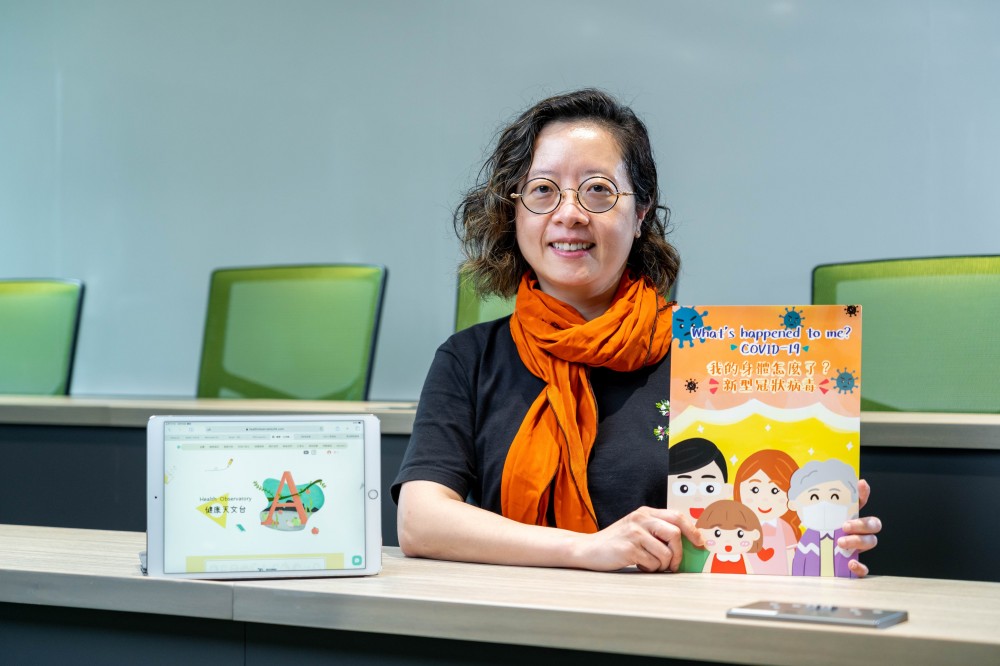HPE scholar creates website and uses social media to spread awareness of infection prevention

Dr Peggy Or Pui-lai with a book from the “What’s happened to me” picture book series.
(Photo credit: Publication by the Hong Kong Federation of Education Workers (HKFEW))
In the midst of a lingering pandemic, people are growing keener about searching for information related to infection prevention and health. Seeing the public need for such information, Dr Peggy Or Pui-lai, Assistant Professor from the Department of Health and Physical Education (HPE), created the “Health Observatory” website in mid-2020 when the pandemic was just starting to spread and have a global impact, targeting kids and parents initially. The website disseminates information related to COVID-19 as well as general health issues, helping the public to feel better prepared for a prolonged fight against the virus.
The Health Observatory website contains many short videos and VR games that motivate children to learn by themselves. “To cater to the learning preferences of young audiences, cartoons and animations are widely used in the videos, games and e-books available on the platform,” Dr Or explained. “Through these learning tools, people learn how to wear a face mask properly and how to keep their hands clean. There are many other small tips for infection prevention posted on it too.”
Dr Or is an expert on infection control and quality of healthcare. To promote the website, she went to kindergartens to explain its content and to answer enquiries. She received a very positive response from the kids. “They liked watching the animations, and they danced to the videos that taught how to wash your hands with a hand-rub dance. Some kindergarten principals play the video on the website every morning. It is simply lovely to see kids learn how to keep their hands clean by dancing,” she said with a warm smile.
Encouraged by the success of the website, Dr Or and her team at HPE created a Facebook page, “Fact Check Today”, at the end of 2020. The page aims to help the elderly, whose information needs are often underestimated. At the beginning, the team posted information related to the pandemic on the page, such as whether taking a hot bath helps to prevent contracting the disease. Now, the page covers a wider variety of topics. “The Facebook page addresses the health concerns of elderly people and provides seasonal information. During the lunar new year, for instance, we published a post about whether lily bulbs are edible,” Dr Or said.
After some time, the website and Facebook page managed to accumulate a wealth of information on COVID-19 and public health. Making use of the information, Dr Or’s team published the “What’s happened to me” series of picture books in mid-2021 to educate readers about the symptoms and impacts of COVID-19, influenza and hand-foot-mouth disease on our bodies. Her team consolidated the information, sorting it into four topics: drug use, daily health tips, disease prevention and food safety. Digital books covering these four areas are now available on both the Health Observatory website and Fact Check Today.
The target audience of Fact Check Today has been expanded to include people of all ages. Students from HPE will answer the questions people leave on the Facebook page. Dr Or’s students visited elderly homes to give talks on topics such as whether it is hygienic to re-boil water, or whether eating fish will cause eaters to contract any viruses. They also taught the elderly how to open Facebook accounts so they can access Fact Check Today.
Empowering the public through knowledge transfer has long been a top agenda of FLASS and EdUHK. Dr Or and her team are excited to know that their efforts in promoting health awareness are being recognised by and having a positive impact on the public. “In the end, the eagerness of the public to practise what they have learnt from the website and the Facebook page is our biggest reward,” Dr Or said.


